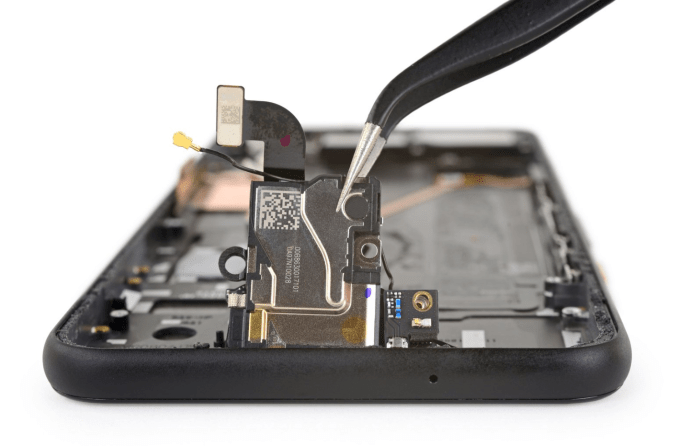Technology

Two lawmakers have asked the governmentmost senior U.S. intelligence official to assess if video-sharing app TikTok could pose &national security risks& to the United States.
In a letter by Sens. Charles Schumer (D-NY) and Tom Cotton (R-AR), the lawmakers asked the acting director of national intelligence Joseph Maguire if the app maker could be compelled to turn Americans& data over to the Chinese authorities.
TikTok has some 110 million downloads to date and has spiked in popularity for its ability to record short, snappy videos that are sharable across social media networks. But the lawmakers say because TikTok is owned by a Beijing-based company, it could be compelled by the Chinese government to turn over user data — such as location data, cookies, metadata and more — even if itstored on servers it owns in the United States.
Both Schumer and Cotton warn that TikTokparent company, ByteDance, is &still required to adhere& to Chinese law.
&Security experts have voiced concerns that Chinavague patchwork of intelligence, national security, and cybersecurity laws compel Chinese companies to support and cooperate with intelligence work controlled by the Chinese Communist Party,& the letter, dated Wednesday, said. &Without an independent judiciary to review requests made by the Chinese government for data or other actions, there is no legal mechanism for Chinese companies to appeal if they disagree with a request.&
That same legal principle works both ways. U.S. companies have been shut out, or had their access limited, in some nation states — including China — over fears that they could be compelled to spy on behalf of the U.S. government.
In the aftermath of the Edward Snowden disclosures, which revealed the U.S. governmentvast surveillance operation, several major tech companies were all dropped from Chinaapproved state purchases list amid fear of U.S. cooperation in surveillance.
The senators also said they are concerned that the app was censoring content &deemed politically sensitive& to Beijing. In September, The Guardian revealed that the appmoderators actively censor content relating to Tibetan independence, the Tiananmen Square massacre and the banned religious group Falun Gong.
They also said the app could pose a &counterintelligence& threat as it could be used as a foreign influence tool as seen in the 2016 U.S. presidential election.
When reached, a spokesperson for the Office of the Director of National Intelligence would not comment.
TikTok said it was &carefully reviewing& the letter.
&We will not be offering any further comment on it at this time other than to reaffirm that TikTok is committed to being a trusted and responsible corporate citizen in the U.S., which includes working with Congress and all relevant regulatory agencies,& said TikTok spokesperson Josh Gartner.
- Details
- Category: Technology
Anyone who has tried to ride an electric scooter knows the likelihood of finding one with a charged battery is quite low. Swiftmile, which just landed a contract with the city of Austin, supplies cities and private operators with docks equipped to park and charge both scooters and e-bikes.
What Swiftmile offers serves as a win for operators, riders and cities alike. Operators can provide a better (charged) product to their customers, the likelihood of finding a charged scooter increases and cities can better control sidewalk clutter and issues pertaining to improper parking. Unfortunately, the downside falls on those relying on charging scooters to make extra income.
When Swiftmile deploys in Austin, the plan is to start with 10 stations, which comes out to about 80 parking slips. The company hopes to do this by the end of the year. Austin has become a major micromobility hub, with seven providers operating a total of 17,600 vehicles in the city. In fact, itbecome known as a place that many other cities look to for regulation.
&What we do with cities is we get permission from them, we get an encroachment permit and then itup to us to monetize off the scooter providers,& Swiftmile co-founder and CEO Colin Roche told TechCrunch. &What we do is put our system down and, you can think of it like a gas station in the middle of where all the scooters are. You don&t want a lot of people having to drive in to pick all these scooters up. I think thatgoing to diminish more. If the asset is in the field right there, then you incentivize a rider to ride to the station with credit.&
From there, Swiftmile charges the operators by the minute, but not to exceed a certain amount, depending on the market. Initially, the docking system will be open to all operators in order to show them how it works and how beneficial it can be. After a certain period of time, Swiftmile will only charge its customers& scooters.
[gallery ids="1900988,1900989,1900990"]
&Herethe key piece,& Roche said. &Our system is really intelligent, so we have the ability to detect whose scooter it is. When it gets plugged in, we pulse the system and it tells us what kind of scooter it is.&
That makes it so a rider could still park any scooter there, but only Swiftmile customers will get their scooters charged.
In addition to Austin, Swiftmile has also launched a mobility hub in Berlin, and plans to deploy more. On the operator side, Swiftmile has partnered with Spin to create branded charging hubs exclusively for Spin scooters. In the U.S., Swiftmile has deployed more than 50 stations. In Austin, however, the charging hubs are vehicle agnostic and will mark Swiftmilefirst public system.
The same will go for Pittsburgh, where Swiftmile will deploy about 50 stations in early 2020. Thatall part of the Pittsburgh Micromobility Collective, which includes Spin, Zipcar, Ford Mobility, Waze and Swiftmile.
Swiftmile got its start as a bike-share operator for private companies, including Tesla and Google. To date, the company has raised a little more than $5 million from Sinai Ventures, Verizon Ventures and others. Additionally, Swiftmile just received a term sheet for a $12 million Series A round.
*Verizon owns TechCrunch, but has no influence on our coverage.
- Details
- Category: Technology
Read more: Swiftmile will become the ‘gas station’ for electric bikes and scooters in Austin
Write comment (95 Comments)I&ve been tearing my gadgets apart for as long as I can remember. Consoles, phones, printers, whatever — I&ve always needed to see what makes it all work. Sometimes they even work when I put them back together.
As soon as Google announced that the new Pixel 4 had friggin& radar built-in for detecting hand gestures, I needed to see under the hood. While I haven&t picked up a Pixel 4 yet, our friends over at iFixit busted out the heat guns and did what they do best, tearing the Pixel 4 XL down to parts and uncovering the Project Soli radar chip along the way.

Image Source: iFixit
That board you&re looking at contains a good amount of stuff beyond the Soli chip — italso where you&ll find the earpiece speaker and the ambient light sensor, for example. The Soli chip seems to be that little greenish box in the upper-right area.
Alas, there&s… not a ton to learn just from looking at it. Google has spent the last few years working on this, and they&ve ended up with something thathonestly a bit wild. With no moving parts, and without line of sight, these chips are able to do things like detect when people are near the device (and how many), whether they&re standing or sitting, how they&re moving their hands and more. As iFixit so succinctly puts it, &TL;DR: magic rectangle knows your every move.&
For anyone looking to tear apart the Pixel 4 XL themselves, be it to make repairs or just out of curiosity, make sure you know what you&re getting into. iFixit gives the device a relatively paltry 4 out of 10 on its repairability score, citing easily breakable pull tabs and particularly strong adhesives as obstacles along the way. You can find their full teardown here.

Image Source: iFixit
- Details
- Category: Technology
Read more: Here’s what the Pixel 4’s radar chip looks like
Write comment (98 Comments)The Daily Crunch is TechCrunchroundup of our biggest and most important stories. If you&d like to get this delivered to your inbox every day at around 9am Pacific, you can subscribe here.
1. Twitter Q3 misses big on revenues of $824M and EPS of $0.05 on the back of adtech glitches
Twitter said the huge drop in performance &was impacted by revenue product issues, which we believe reduced year-over-year growth by approximately 3 or more percentage points, and greater-than-expected seasonality.&
The company has made a significant shift in the last year to tracking a new user metric of its own making — monetizable daily active users, which is the number of users who are being served ads. More established metrics like daily and monthly active users have stagnated and even declined in recent years.
2. Lowlights from ZuckerbergLibra testimony in Congress
&I don&t control Libra& was the central theme of Facebook CEO Mark Zuckerbergtestimony yesterday, while the House of Representatives unleashed critiques of his approach to cryptocurrency, privacy, encryption and running a giant corporation.
3. Announcing the Disrupt Berlin 2019 agenda
Disrupt Berlin will run on December 11 and December 12, when we&ll sit down with CEOs from big-name companies such as Away, UIPath and Naspers, as well as leading investors from Atomico, SoftBank and GV. (Tickets are available here.)
4. By tweeting from a SCIF, House lawmakers put national security at risk
If you thought storming into a highly secured government facility with your electronics but without permission was a smart idea, you&d be wrong. But that didn&t stop Rep. Matt Gaetz and close to three-dozen of his Republican colleagues from doing exactly that.
5. Virgin Galactic becomes the first public space tourism company on Monday
The companyshareholders have approved a merger with Chamath Palihapitiyaspecial Social Capital Hedosophia holding company, with a debut on the NYSE for the newly merged public entity scheduled for Monday.
6. Cybersecurity automation startup Tines scores $4.1M Series A led by Blossom Capital
Tines automates many of the repetitive manual tasks faced by security analysts so they can focus on other high-priority work. The founders have bootstrapped the company until now.
7. Bill McDermott aims to grow ServiceNow like he did SAP
During the companyearnings call, outgoing CEO John Donahoe said that McDermott met all of the boardcriteria for its next leader — all in the service of building toward a $10 billion revenue goal. (Extra Crunch membership required.)

- Details
- Category: Technology
Read more: Daily Crunch: Twitter revenue disappoints
Write comment (97 Comments)
Caffeine, the live streaming service founded by former Apple designers Ben Keighran and Sam Roberts, has signed an exclusive streaming deal with Offset.
The startup has been relatively quiet since raising nearly $150 million in funding last year, but Keighran (who previously co-founded Chomp and then served as product design lead for Apple TV) told me thatgoing to start changing as the company prepares to leave beta testing.
Keighran also pointed to the Offset deal as exemplifying several aspects of his vision for how Caffeine can become &the future of live TV.&
As part of the deal, Offset will host two exclusive shows on his Caffeine channel — a weekly stream at 6pm Pacific on Sundays where he&ll play his favorite games and try out new games suggested by fans, plus a second show called &Bet with Set,& where he&ll compete with celebrity guests on a variety of a challenges.
&With Caffeine, I can create my content in an organic way that lets me make real connections with my community,& Offset said in a statement. &They have created new technology that takes the lag out of online interactions and it makes me reachable in a way that other platforms simply can&t. Caffeine allows me to be myself so I&m trying to reach these kids to show them that everybody is a part of a team and we&re all one.&
Other Caffeine streamers include basketball player LaMelo Ball, rapper The Game and rapper Lil Xan, as well as game streamers Cartoonz, Ohmwrecker and Cranier. The streams are then monetized by allowing fans to purchase and send virtual gifts.
Keighran said that game streaming will be a key part of Caffeineappeal, but he suggested that compared to the currently dominant Twitch (owned by Amazon), Caffeine will have an easier time expanding beyond gaming.
He added that not only is Caffeine designed for a wide range of live-streaming content, but it also has the advantage of backing from 21st Century Fox and its new owner Disney, which was presumably a big part of how it acquired the streaming rights to sports content from Fox Sports and Disney-owned ESPN.
&We&re getting content rights from Fox and Disney that Google and Amazon would love to have,& Keighran said. &Thatpart of the secret sauce that attracts athletes and hip hop artists — they can stream sports content and video games with a better community filter, chat, new monetization with no ads. I think Offset is the perfect example.&
- Details
- Category: Technology
Read more: Caffeine signs streaming deal with rapper Offset
Write comment (94 Comments)
Modern Animal just raised a $13.5 million seed round of funding to fuel its mission of offering pets, humans and veterinarians a better experience. Led by Founders Fund, with participation from Upfront Ventures, Susa Ventures and others, the round will enable Modern Animal to open its first location in Los Angeles early next year.
Founded by Steven Eidelman, who previously founded dog-tracking startup Whistle and sold it to Mars Petcare, Modern Animal pegs itself as the next-generation veterinary care platform. You can think of it as a One Medical model for pets, where all of the vets are full-time and receive equity in the company.
&If you think about similarities, we are committed to using technology and design to reinvent the way pet care is delivered,& Eidelman told TechCrunch. &There are lots of similarities with One Medical.&
Modern Animal will be led by Dr. Christie Long, DVM, the former director of veterinary medicine at Petco. For a $100 yearly membership fee, Modern Animal offers unlimited exams, 24/7 virtual care, in-app prescription requests and delivery and more. However, there is a charge for additional services.
&Our goal is to be at parity with the market,& Eidelman said. &We&re not trying to create a high-end experience. We want to build the most efficient system that allows us to deliver the best care. Those efficiencies should funnel into long-term lower cost of care.&
Modern Animalfirst location will have a dental and surgery suite, but does not do any overnight services.
&We&re not trying to operate as an emergency room nor are we hiring specialists,& Eidelman said. &If animals need a more complex level of care, we&ll refer them to the best ER or specialist.&
In the next five years, Modern Animal envisions operating 50 locations throughout the U.S. Each location will continue to be designed with environmental considerations, like no ringing phones at the front desk, and keeping dogs and cats in separate areas. That last piece is key for humans who may be allergic to cats or dogs, and for animals who don&t like to interact with different species.
&The idea is to create a really safe and comfortable environment for the animal,& Eidelman said. &But the only way we can get them great care is if we also take care of humans.&
- Details
- Category: Technology
Read more: Modern Animal raises $13.5 million to make going to the vet suck less
Write comment (97 Comments)Page 541 of 5614

 11
11